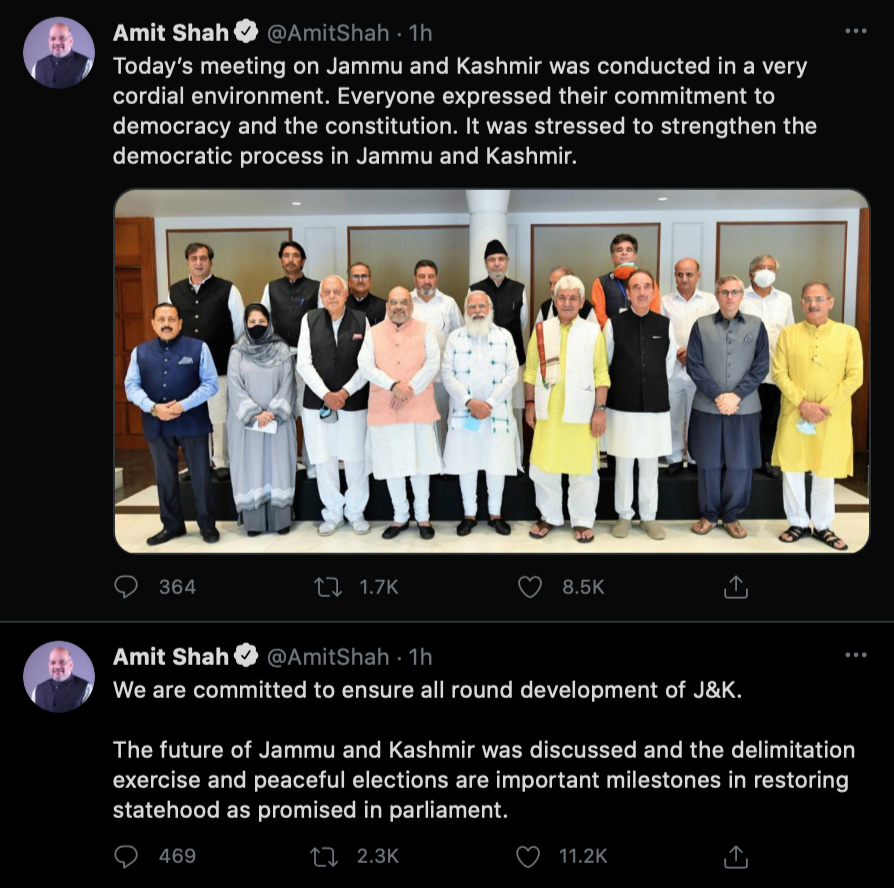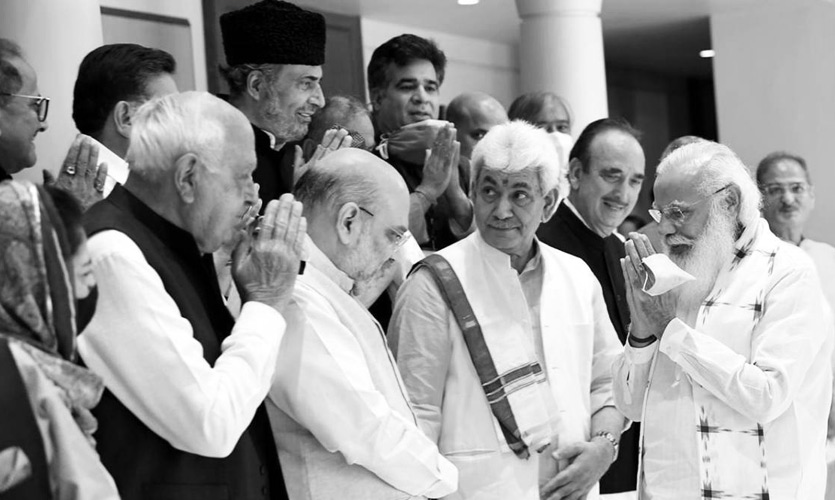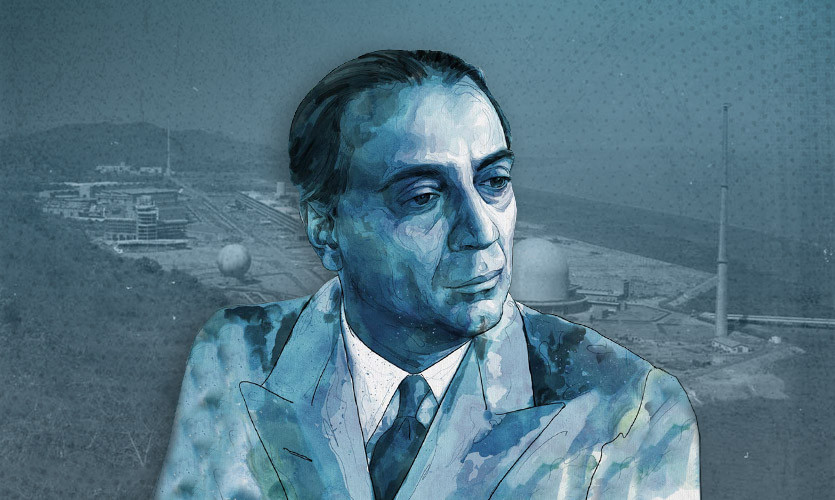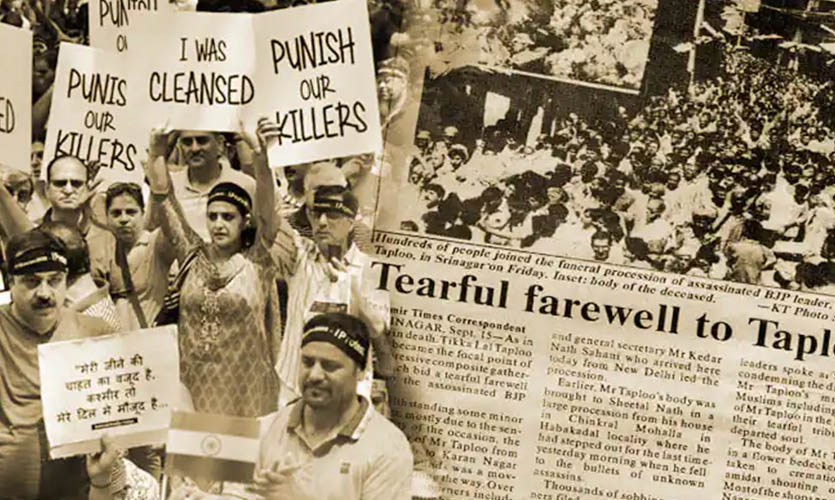Prime Minister Narendra Modi held an all-party meet with numerous Jammu & Kashmir party leaders today, the first since the historic August 2019 decision to bifurcate the state into union territories.
The central government invited 14 leaders from Jammu & Kashmir for a meeting at the PM’s official residence in New Delhi.
“Mission Kashmir”
The main agenda of the centre’s meeting about “mission Kashmir” was to discuss the process of delimitation ahead of assembly polls, likely to be held this December or in March next year and return the region to normal political functioning. 14 leaders including four former chief ministers – Dr. Farooq Abdullah and Omar Abdullah of the National Conference (NC), senior Congress leader Ghulam Nabi Azad, and People’s Democratic Party (PDP) president Mehbooba Mufti – were present to attend the discussion. The meeting was the first round of interaction between the centre and local party leaders after the abrogation of Article 35A, 370 and the passing of the Jammu & Kashmir (J&K) Reorganisation Bill in 2019.
Following the August 2019 decision, a delimitation commission was formed on March 6, 2020, under the leadership of retired SC Justice Ranjana Desai. It also constitutes of Election Commissioner Sushil Chandra, J&K State Election Commissioner K.K. Sharma, Farooq Abdullah, Mohammad Akbar Lone and Hasnain Masoodi of the National Conference, Union Minister of State in the Prime Minister’s Office Dr. Jitendra Singh, and Bharatiya Janata Party’s (BJP’s) Jugal Kishore Sharma. The commission’s goal is to redraw assembly seats according to the geographical spread, current demography and the Indian constitution, and was given an extension to present its finding owing to the limitations presented by the pandemic. The number of seats is expected to increase from 107 to 114, effectively benefitting the Jammu region. The last delimitation exercise in J&K was carried out in 1995 based on the 1981 census, and as per the J&K constitution.
The district development council polls held last year saw a sweep by the People’s Alliance for Gupkar Declaration (PAGD), an alliance of regional parties including the PDP, the NC and the Communist Party of India (Marxist), making their influence noteworthy on 110 out of 280 seats despite the centre’s intervention. The BJP however did manage to become the single largest party, bagging 75 seats.
Recap
The J&K Reorganisation bill was introduced in the parliament by the newly appointed Home Minister Amit Shah on August 5, 2019, effective starting October 31, 2019. This act meant the abrogation of Article 370 that previously allowed the state authorities to be responsible for all affairs excluding matters of defence, communications, and external affairs, which rested with the central government. Following this rescindment, since the state has been reorganised into two separate Union Territories (UTs) of J&K and Ladakh, the centre now has control of all areas but public order and policing. This effectively invalidates the special status awarded to the state of Jammu and Kashmir, also abolishing Article 35A which disallowed immovable property rights, government jobs and other aids to non-permanent residents.
Article 370 was initially put into place to assist the integration of the state of Jammu and Kashmir with the Republic of India in 1950. The reorganisation bill has divided the state into two union territories, with the central government laws applicable to both, regardless of local authorities’ agreement. The decision was particularly welcomed by the people of Ladakh that includes the Kargil and Leh districts, since they are now recipients of separate funding which earlier was apparently directed only towards the military budget and controlling militancy in Kashmir, along with alleged local level corruption.
Jammu and Kashmir and its people have been subject to suffering historically and have a “wounded psyche”. The main points of India’s territorial conflict in Jammu and Kashmir are a) the territory presently administered by Pakistan as ‘Azad Kashmir’ and referred as ‘Pakistan occupied Kashmir’ (PoK) by India; b) the territory along the Sino-Indian border claimed by India as part of present day-Ladakh and occupied by the Republic of China, administered as ‘Aksai-Chin’. A leading expert on India views the move of reorganising and separating the state into two separate UTs as India’s attempt at separating it’s two major issues with its neighbours. A professional from the Institute of South and Southeast Asian and Oceania Studies was quoted by the Hindustan Times, saying that India has tried to sever “the two most ticklish disputes in the world from each other” and “to try to settle the Kashmir dispute unilaterally”.
The Fallout
Following the Indian government’s decision to bifurcate the state of Jammu and Kashmir, the Chinese government had voiced its displeasure publicly, terming Ladakh’s UT status “unacceptable”.
“China is always opposed to India’s inclusion of the Chinese territory in the western sector of the China-India boundary into its administrative jurisdiction. This firm and consistent position remains unchanged. Recently India has continued to undermine China’s territorial sovereignty by unilaterally changing its domestic law. Such practice is unacceptable and will not come into force. We urge India to exercise prudence in words and deeds concerning the boundary question, strictly abide by relevant agreements concluded between the two sides and avoid taking any move that may further complicate the boundary question.”
– Hua Chunying, Spokesperson, Ministry of Foreign Affairs of the People’s Republic of China
According to a report by the Al Jazeera, the June 2020 border skirmish between China and India along the Line of Actual Control – “the deadliest clash since 1975” – has also been linked to India’s move to repeal Article 370 and reorganise Ladakh into a UT. Additionally, there has also been an increase in Pakistan’s violation of the ceasefire in several sectors of present-day Kashmir.
This move also proved controversial as it was immediately followed by the longest telecommunications and Internet blackout in a democracy, throughout Jammu and the Kashmir valley. While limited broadband and mobile services were restored earlier this year in January 2020, 4G services come and go. According to a Reuters report, this was the 51st Internet shutdown in India in 2019, with the country also topping the 2018 list of countries issuing the most blackouts.
The move was followed by arrests of several opposition leaders including the PDP president Mehbooba Mufti and the National Conference leader Omar Abdullah, along with detention of other party members such as Sajjad Lone and Imran Ansari of Jammu and Kashmir People’s Conference. Moreover, since the announcement of the reorganisation of the state, 99 percent habeas corpus cases reportedly remain pending in the Jammu and Kashmir High Court. According to the Al Jazeera, “Hundreds of people arrested in the Kashmir lockdown have been held without trial by the Indian authorities and moved to jails far from home.” While this move is completely warranted under the Public Safety Act (PSA), it facilitates detention of up to two years “without trial”, making it subject to criticism since proving innocence is out of the question.
There appears to be an absence of voices of the people who are directly affected by these policies, paving ways for selective reporting. Irrelevant of the positive or negative consequences or sentiments, the coverage of real time implications on the citizens involved, which is largely people belonging to the Islamic community, seems missing.
Today’s Response
After the meeting, all J&K party leaders appreciated the cordial way in which it was held and have expressed their willingness to work with the centre toward restoring normalcy to the region.

As expected, all J&K party leaders presented a united front for the restoration of J&K’s statehood. The centre has maintained its position that it will be considered, but only after elections. Reinstating Article 370 however, is not up for debate for the centre. While Mehbooba Mufti reiterated that the people of Kashmir will keep democratically protesting the “unconstitutional and illegal” way in which Article 370 was removed by the BJP, other leaders including Ghulam Nabi Azad and former PDP leader Muzaffar Beigh asserted that the matter is “sub judice”. Mufti commended the centre’s efforts of carrying out peace talks with Pakistan, emphasising the need for better trading relations between the countries to help with youth unemployment.
Beigh echoed the centre’s welcoming gesture and assured that there was “complete unanimity over restoring peace in the region”. Congress leader Azad stated that there was no better time to restore J&K’s statehood, while also agreeing with the central party’s sentiment that the region needs to be made hospitable for the exiled Kashmiri Pandits to return.
NC leader Omar Abdullah has cited concern over the roadmap and wants the process of delimitation to be reconsidered. “You wanted the state at par with the country, but by carrying out a separate delimitation exercise for it now you are treating it as a separate entity, which defeats the August 5 decision,” said Abdullah after the meeting. He added that he agreed with the PM’s decision to have an elected government in charge as a bureaucratic one won’t be acceptable to the people. Abdullah also pointed out that it was important to continue talks with Pakistan, even if it were behind closed doors like National Security Adviser Ajit Doval did recently.
The centre’s priority for Jammu & Kashmir is to create job opportunities for the young, carry out delimitation, and hold elections. As of yet, it is unclear if the elections to be held will be as per J&K’s current status as a UT or an eventual state.
The Horus Eye is a weekly column written by Divya Bhan analysing current affairs and policies. This column does not intend or aim to promote any ideology and does not reflect the official position of The Sparrow.
Also read: The Curious Case Of Compassion Fatigue With The Rohingyas
Also read: GNCTD Undermines A Free Functioning Opposition; A Threat To Democratic Systems










